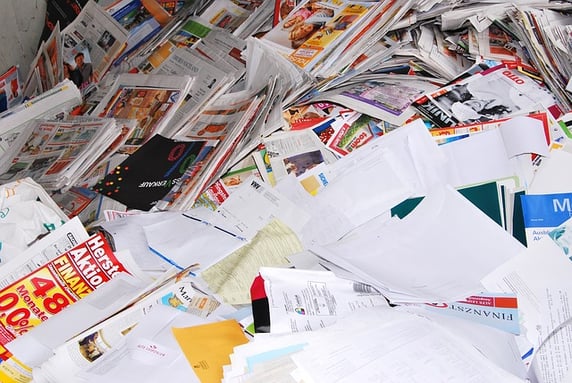5 Reasons Why the Dumpster is a Small Business Security Enemy
Wed, Jul 13, 2016
By: Jim Beran

When you throw something away in a dumpster, chances are that you don’t stop to wonder if that trash could eventually fall into the wrong hands. But whether it’s a banana peel or old business records, just tossing something in the trash isn’t as secure as you think.
In a business scenario, it’s not uncommon to deal with what’s known as Personally Identifiable Information — or PII. PII includes names, signatures, addresses, any type of account number, and medical or financial information. Many types of financial or health-related records include PII, and state and federal regulations are in place to ensure that these types of records are properly handled from the start until their destruction.
However, sensitive information can be compromised when documents are not properly disposed of. We’ve all heard the news stories in which hundreds or thousands of sensitive records are found in dumpsters or other insecure trash receptacles, putting the business and its customers, clients, or patients at risk for identity theft.
When it comes to keeping your small business secure and compliant, document destruction is as important as secure document storage. Here are five reasons why you should never dispose of business documents in the dumpster:
-
Identity theft is real.
- There were more than 490,000 identity theft related complaints made to the Federal Trade Commission (FTC) in 2015 alone. Worse, in many cases identity theft isn’t reported or noticed until long after it occurs. Florida is one of the top three states in the nation with the highest per capita rate of reported identity theft. Identity theft is real, and it can cause major damage to one person’s credit or reputation — let alone a whole company.
-
Dumpsters are thievery goldmines.
- Identity thieves search through discarded mail and documents in the trash, looking for personal information that could give them access to credit cards. This type of information gives thieves easier access to accounts, passwords, or data that can be stolen or even used against you or your clients. The public waste bin doesn’t typically involve any extra security measures, meaning that anyone could gain access if they wanted.
-
There’s no proof of disposal.
- Once you dump your documents in the dumpster, most people assume it’s headed for the incinerator or landfill. Unfortunately, there are no certificates of destruction when it comes to public waste management, and you’ll never know if those documents really made it to the trash heap. Even then, who’s to say your business documents aren’t still in jeopardy?
-
Digital records are just as susceptible.
- Even though paper documents and unshredded mail are often tossed in the dumpster, so are old computers, hard drives, and smart phones. Be sure to wipe any trace of digital information from your machine before retiring it. Better yet, use hard drive shredding to physically destroy the drive in an industrial shredder.
-
Even shredded documents aren’t always safe.
- Documents shredded in a personal shredder are often shredded in top-to-bottom vertical strips, which can leave the papers more vulnerable to reassembly. On the contrary, documents shredded with an industrial shredder in a cross-cut pattern turn into confetti and become impossible to identify.
Although the dumpster is a business security hazard, you can avoid identity theft and potential noncompliance repercussions by taking the appropriate precautions.
For instance, U.S. legal regulations require secure disposal methods for any type of record or documents containing personally identifiable information (PII). This can be as basic as a name and address, telephone number, email address, or social security number. Businesses must be aware of the types of documents they handle on a regular basis, and be prepared to follow compliance practices to ensure non-permanent documents are stored securely and disposed of appropriately.
Then, be sure you dispose of any potentially sensitive information by properly wiping digital information and shredding paper documents through an industrial shredder before throwing them away. Consider working with a secure document storage and destruction company to help handle your document disposal on the proper timeline.
There’s a lot at risk when it comes to records storage and disposal, and managing proper document destruction is crucial. Remember, your business information is not the same as a banana peel, so treat it with care and don’t let your guard down, even when it comes time to throw things away.
Learn more about how Gilmore Services can help your business stay organized, compliant, and protected with proper document destruction services and guidance.